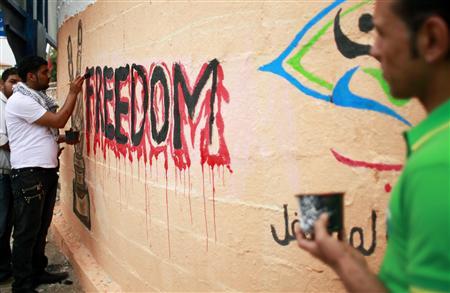(Reuters) – Palestinian prisoners in Israeli jails
agreed on Monday to an Egyptian-brokered deal aimed at ending a mass hunger strike that challenged
Israel’s policy of detention without trial and raised fears of a bloody Palestinian backlash if any
protesters died.

Palestinian artist paints a mural in Gaza City in support of Palestinian prisoners on a hunger strike
in Israeli jails May 14, 2012. REUTERS/Suhaib Salem
Most of some 1,600 prisoners, a third of the 4,800 Palestinians in Israeli
jails, began refusing food on April 17 although a few had been fasting much longer – up to 77
days.
Their protest centered on demands for more family visits, an end to solitary confinement
and an end to so-called “administrative detention”, a practice that has drawn international criticism
on human rights grounds.
Palestinian officials said Egypt had drafted an agreement in Cairo with
representatives of the Palestinian prisoners, and that inmates met during the day and had agreed to the
terms.
There was no immediate word from the prisoners as to whether any had actually ended their
strike.
An Egyptian official involved in the talks said that under Monday’s deal to end the
strike, Israel had agreed to end solitary confinement for 19 prisoners and lifted a ban on visits to
prisoners by relatives living in the Hamas-ruled Gaza Strip.
Israel also agreed to improve other
conditions of detention, and to free so-called administrative detainees once they complete their terms
unless they are brought to court, the Egyptian official said.
Gaza’s Hamas leaders hailed the
strike as a successful campaign against Israel and celebrations quickly spread to the streets where
motorists honked horns, and passersby embraced and shouted “Allahu Akbar,” the Arabic for “God is
great.”
“This is a first step toward liberation and victory,” said Fawzi Barhoum, a spokesman
for the Islamist group.
Israel saw the deal as a goodwill gesture to Western-backed Palestinian
President Mahmoud Abbas, who holds sway in the West Bank, a territory separate from Islamist-ruled
Gaza. The territories, where Palestinians want a state, were captured by Israel in a 1967
war.
Mark Regev, a spokesman for Prime Minister Benjamin Netanyahu, said Israel had “negotiated
an end to the strike” in answer to a request from Abbas.
“It is our hope that this gesture by
Israel will serve to build confidence between the parties and to further peace,” Regev said.
The
hunger strikers included militants from Hamas and Islamic Jihad, which reject peace with Israel, as
well as members of Abbas’s Fatah group.
PLEDGES TO EASE CONDITIONS
Israel’s Prisons
Authority, confirming the deal to end the prisoners’ action, said “an agreement has been signed to
bring about the end of a 28-day hunger strike by Palestinian security prisoners.”
Prisoners who
sign a commitment “not to engage in actions contravening security inside the jails” would have prison
conditions eased.
In a statement, the Israeli authority said that improvements for such
prisoners would include a lifting of solitary confinement and a possibility of relatives visiting from
Gaza.
Relatives’ visits from Gaza were suspended after Israeli soldier Gilad Shalit was
captured by Palestinian militants and taken to Gaza in 2006. He was released last October in exchange
for more than 1,000 Palestinian prisoners.
Israel did not say whether it would free any
administrative detainees, but pledged in its statement that an inter ministerial team would look at
prisoner requests and issue recommendations.
Around 320 of Palestinian prisoners are held in
“administrative detention”, a security measure Israel defends as a precaution to protect undercover
sources.
Many of the other prisoners have been convicted of serious crimes, including murder.
Palestinian leaders say they should be treated as prisoners of war, something Israel
rejects.
Israel says the detentions without trial are necessary because some cases cannot be
brought to open court for fear of exposing Palestinian intelligence sources who have cooperated with
Israel.
Palestinians jailed by Israel are held in high esteem by their compatriots, who see them
as heroes in what they term a struggle against occupation.
Two inmates who helped to launch the
strike, Bilal Diab and Thaer Halahla of Islamic Jihad, were in the 77th day of their fast on
Monday.
Last week, Israel’s Supreme Court turned down their request to be freed from detention
without trial but said security authorities should consider releasing them for medical
reasons.
A month ago, Israel released hunger striker Khader Adnan, an Islamic Jihad member, amid
concern he would die. He agreed to end his fast after 66 days in exchange for a promise not to renew
his detention.
(Additional reporting by Ali Sawafta
and Jihan Abdallah in Ramallah and Allyn
Fisher-Ilan in Jerusalem; Editing by Rosalind Russell)





